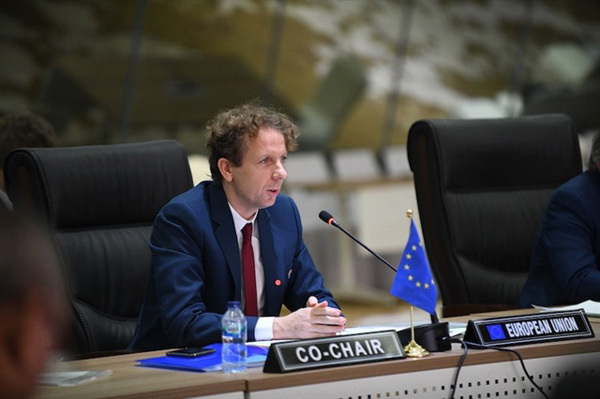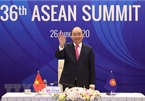 |
| EU Ambassador to ASEAN Igor Driesmans. — Photo courtesy of the Mission of the EU to ASEAN |
What do you think about the role of Vietnam in organising the 36th ASEAN Summit, as well as its efforts during the past six months to promote a 'cohesive and proactive ASEAN'?
Thank you for this opportunity to speak with you. Let me start by saying that Vietnam has just successfully hosted the ASEAN Summit by overcoming some truly unprecedented challenges. For the first time in over half a century of relations, ASEAN leaders met and spoke virtually, by videoconference. The technical and logistical aspects of this undertaking are impressive, and Vietnam was able to achieve this – even including a colourful opening ceremony! As Prime Minister Nguyen Xuan Phuc emphasised in his speech during the summit, the world is changing irreversibly, and this event proves that ASEAN is readily adapting to these changes.
Vietnam’s focus on strengthening a cohesive and proactive ASEAN could not be more relevant than it is today when the pandemic has provoked a global economic shock unlike any other in recent history. The Prime Minister spoke of the need to uphold the spirit of solidarity, co-operation and the sense of responsibility towards the international community, and I believe that this has been the driving force behind Vietnam’s chairmanship of ASEAN since the early days of this crisis.
Under the leadership of Vietnam, ASEAN has shown a real willingness to come together to find regional solutions and to mitigate the effects of this crisis. ASEAN agreed the statement of the Economic Ministers’ on Strengthening Economic Resilience in Response to COVID-19, which paved the way for the adoption of the declaration of the Special ASEAN Summit on the Coronavirus Disease in April. ASEAN leaders agreed to co-operate on health and research, consular assistance, supply chains and the post-COVID recovery, and since then ASEAN countries have been actively sharing information and co-ordinating on disease control at the regional level.
Vietnam has also been able to reaffirm the centrality and unity of ASEAN by maintaining the regular, substantive engagement between the region and its partners since the outbreak of the pandemic. One example of such dialogue was the EU-ASEAN Ministerial Video Conference on the Coronavirus Disease in March, where ASEAN showed itself to be a united and cohesive group. I think that these efforts are also bearing fruit in the fight against COVID-19, with the region currently displaying a high proportion of recoveries from confirmed cases, low fatality rates and few incidents of community transmission.
How do you assess the results of the 36th ASEAN Summit? What were the most important outcomes?
This was the first official summit hosted by Vietnam as the 2020 ASEAN Chair, and despite the difficult circumstances, it was able to achieve several major outcomes.
It was very encouraging to see that ASEAN leaders continued to pursue an ambitious regional integration agenda, with the announcement of the 'Vision Statement on A Cohesive and Responsive ASEAN: Rising Above Challenges And Sustaining Growth'. With this comprehensive document, they reaffirmed their commitment to pursuing progress across a wide range of areas, in pursuit of the ASEAN Community Vision 2025.
In particular, the vision statement recognised the need to deal effectively with the COVID-19 pandemic and at the same time to promote socio-economic recovery in the region. The leaders agreed to support a post-pandemic recovery plan for ASEAN with wide-ranging actions that aim to strengthen resilience of the regional economy.
The leaders also endorsed a number of important initiatives presented to them at the summit, including the COVID-19 ASEAN Response Fund, the ASEAN Regional Reserve of Medical Supplies for Public Health Emergencies, and the ASEAN Standard Operating Procedures (SOP) for Public Health Emergencies. They also approved the Hanoi Plan of Action on Strengthening ASEAN Economic Co-operation and Supply Chain Connectivity, demonstrating their determination to ensure the flow of food, medicines, as well as medical and other essential supplies in the region. These are all significant deliverables under Vietnam’s theme of 'Cohesive and Responsive ASEAN'.
What issues should ASEAN and Vietnam - as ASEAN chair this year - focus on in the next six months? What will the EU do to promote these key issues?
In the immediate future, the focus should be on keeping control of the outbreak, while also launching a post-pandemic recovery. While global growth rates this year will likely be slower, with careful planning and the right actions there is a chance that ASEAN economies remain reasonably stable and avoid recession. The key issues will be solidarity and co-operation based on jointly agreed proposals, and this is why initiatives like the Hanoi Plan of Action are so important.
The EU will continue to support ASEAN’s efforts to achieve a prosperous, safe and united community, as this brings benefits to both our regions. We were among the first partners to hold a meeting between our foreign ministers on COVID-19, and we will continue to exchange information to identify ways to tackle the crisis. We are currently collaborating on research into COVID-19, with 18 new EU-funded research projects open to ASEAN scientific organisations.
The EU and its member states have so far mobilised over 350 million euros (US$392.6 million) to support health systems and economic recovery in ASEAN under a collective 'Team Europe' approach. We will continue working with ASEAN to ensure that supply chain connectivity is maintained. And while we will continue to expand our free trade and investment agreements in the region, such as the free trade agreement with Vietnam that eliminated 99 per cent of customs duties, our relationship is no longer only about trade and co-operation. Increasingly, the EU and ASEAN are working together on security and defence in areas such as maritime security. We are also intensifying our co-operation on non-traditional security threats related to issues such as resource scarcity, infectious diseases, natural disasters, people smuggling, drug trafficking and transnational crime.
Looking ahead, green economy, digitalisation in the context of the Fourth Industrial Revolution, and the fight against climate change will increasingly become major areas of co-operation between the EU and ASEAN. The green agenda, in particular, is a top priority for the EU and for our partnership with ASEAN. The EU sees ASEAN as an indispensable partner in this regard – together, we can protect the international rules-based order and preserve our 'global commons'. VNS

EU Ambassador hails Vietnam for successfully hosting 36th ASEAN Summit
EU Ambassador to ASEAN Igor Driesmans has hailed Vietnam for successfully hosting the 36th ASEAN Summit by overcoming some truly unprecedented challenges.
 EU Ambassador to ASEAN Igor Driesmans talks to on the outcomes of the 36th ASEAN Summit which was hosted online by Vietnam last Friday.
EU Ambassador to ASEAN Igor Driesmans talks to on the outcomes of the 36th ASEAN Summit which was hosted online by Vietnam last Friday.